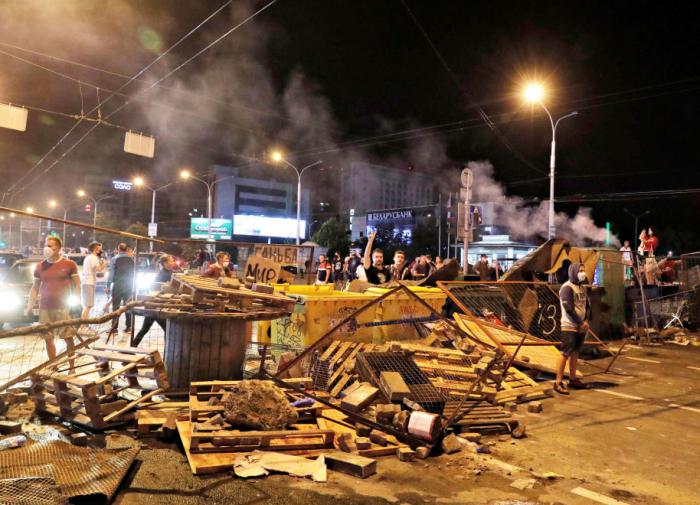Belarus law-enforcers may resort to military weapons to suppress protests in the republic, representatives of the Interior Ministry of Belarus said.

"The protests that have primarily moved to Minsk have become organized and extremely radical. In this regard, employees of internal affairs bodies and servicemen of internal troops will not leave the streets. If necessary, they will use special equipment and military weapons," First Deputy Minister of Internal Affairs of Belarus, Gennady Kazakevich said.
According to Kazakevich, whose comments appeared on the YouTube channel of the Internal Affairs Ministry of Belarus, the Ministry ensures public order and security in the country. "We point out a gradual decrease in the protest movement both in terms of territory and scale," he said.
At the same time, the official believes that the protests have become more radical than before.
"If during the day and in the evening [protesters used] rocks, bottles, knives and sharp tools, then by nightfall there were barricades and burning tires. All this has nothing to do with a civil protest," Kazakevich said making references to protests in Minks on October 11.
According to him, the authorities "came across not only aggression, but groups of militants, radicals, anarchists, football fans, and attempts to repeat the events of early August." According to the official, "it is obvious that they are trying to throw Belarus into the chaos of the 1990s, make it experience the fate of the republics that survived colour revolutions."
As reported in the Ministry of Internal Affairs, as many as 713 people were detained during protests in Belarus on October 11. According to the ministry, as many as 11,000 people took part in 25 actions of protest that took place in the republic on October 11. Numerous clashes between demonstrators and law enforcement officers occurred, security forces used special equipment to disperse demonstrators.
Protests against the results of the presidential election, which took place on August 9, continue in Belarus for three consecutive months. The current head of state, Alexander Lukashenko, who has held this post since 1994, was declared the winner. The protesters do not recognize the official result of the vote, which they consider to be falsified.
Belarus protests get increasingly violent
It is worthy of note that law enforcement officers used brutal violence from the very first days of the protests. To suppress peaceful demonstrations, special forces and internal troops were involved. In August, security forces used water cannons, stun grenades and rubber bullets. Hundreds of people were injured and hospitalized. The authorities subsequently acknowledged the death of three people. One man died during the protests, another one died after being arrested. A 43-year-old resident of Brest, who was shot in the head during the protests on August 11, died at a military hospital.
About 7,000 people, including bystanders, were arrested on August 9-11. According to unconfirmed reports, many civilians were tortured and raped on the way to places of detention.
Although the protests have not caused the Lukashenko regime to fall, the sitting President of Belarus has been losing his legitimacy in the eyes of the international community. On September 24, the European Union issued a statement claiming that the presidential election in Belarus was neither free nor fair, and their results were falsified. The statement also said that the inauguration of Alexander Lukashenko, which was conducted covertly, contradicted the will of the majority of the population of Belarus.
Foreign ministers of EU member states at a meeting in Luxembourg on Monday, October 12, launched preparations for a new list of sanctions against Belarus, which may include President Alexander Lukashenko, EU High Representative for Foreign and Security Policy Josep Borrell said.
Borrell explained that the EU believes that Lukashenko is not ready for a dialogue with the opposition of Belarus. "One gets an impression that the Belarusian authorities are not ready for a dialogue. They reject negotiations, including the OSCE proposal. Lukashenko is not ready to conduct a dialogue, establish contacts in search for a peaceful settlement of the crisis in Belarus," the head of European diplomacy said.
No comments :
Post a Comment